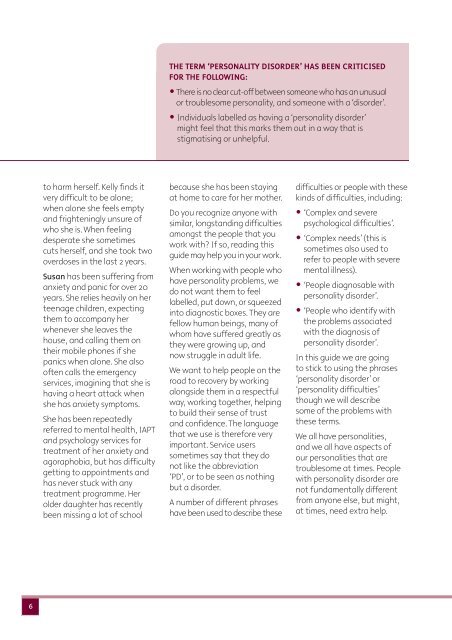Meeting-The-Challenge-Making-a-Difference-Practitioner-Guide
Meeting-The-Challenge-Making-a-Difference-Practitioner-Guide
Meeting-The-Challenge-Making-a-Difference-Practitioner-Guide
Create successful ePaper yourself
Turn your PDF publications into a flip-book with our unique Google optimized e-Paper software.
THE TERM ‘PERSONALITY DISORDER’ HAS BEEN CRITICISED<br />
FOR THE FOLLOWING:<br />
• <strong>The</strong>re is no clear cut-off between someone who has an unusual<br />
or troublesome personality, and someone with a ‘disorder’.<br />
• Individuals labelled as having a ‘personality disorder’<br />
might feel that this marks them out in a way that is<br />
stigmatising or unhelpful.<br />
to harm herself. Kelly finds it<br />
very difficult to be alone;<br />
when alone she feels empty<br />
and frighteningly unsure of<br />
who she is. When feeling<br />
desperate she sometimes<br />
cuts herself, and she took two<br />
overdoses in the last 2 years.<br />
Susan has been suffering from<br />
anxiety and panic for over 20<br />
years. She relies heavily on her<br />
teenage children, expecting<br />
them to accompany her<br />
whenever she leaves the<br />
house, and calling them on<br />
their mobile phones if she<br />
panics when alone. She also<br />
often calls the emergency<br />
services, imagining that she is<br />
having a heart attack when<br />
she has anxiety symptoms.<br />
She has been repeatedly<br />
referred to mental health, IAPT<br />
and psychology services for<br />
treatment of her anxiety and<br />
agoraphobia, but has difficulty<br />
getting to appointments and<br />
has never stuck with any<br />
treatment programme. Her<br />
older daughter has recently<br />
been missing a lot of school<br />
because she has been staying<br />
at home to care for her mother.<br />
Do you recognize anyone with<br />
similar, longstanding difficulties<br />
amongst the people that you<br />
work with? If so, reading this<br />
guide may help you in your work.<br />
When working with people who<br />
have personality problems, we<br />
do not want them to feel<br />
labelled, put down, or squeezed<br />
into diagnostic boxes. <strong>The</strong>y are<br />
fellow human beings, many of<br />
whom have suffered greatly as<br />
they were growing up, and<br />
now struggle in adult life.<br />
We want to help people on the<br />
road to recovery by working<br />
alongside them in a respectful<br />
way, working together, helping<br />
to build their sense of trust<br />
and confidence. <strong>The</strong> language<br />
that we use is therefore very<br />
important. Service users<br />
sometimes say that they do<br />
not like the abbreviation<br />
‘PD’, or to be seen as nothing<br />
but a disorder.<br />
A number of different phrases<br />
have been used to describe these<br />
difficulties or people with these<br />
kinds of difficulties, including:<br />
• ‘Complex and severe<br />
psychological difficulties’.<br />
• ‘Complex needs’ (this is<br />
sometimes also used to<br />
refer to people with severe<br />
mental illness).<br />
• ‘People diagnosable with<br />
personality disorder’.<br />
• ‘People who identify with<br />
the problems associated<br />
with the diagnosis of<br />
personality disorder’.<br />
In this guide we are going<br />
to stick to using the phrases<br />
‘personality disorder’ or<br />
‘personality difficulties’<br />
though we will describe<br />
some of the problems with<br />
these terms.<br />
We all have personalities,<br />
and we all have aspects of<br />
our personalities that are<br />
troublesome at times. People<br />
with personality disorder are<br />
not fundamentally different<br />
from anyone else, but might,<br />
at times, need extra help.<br />
6


